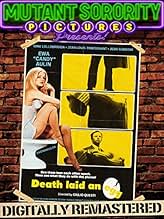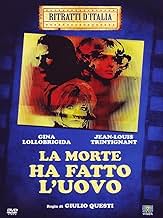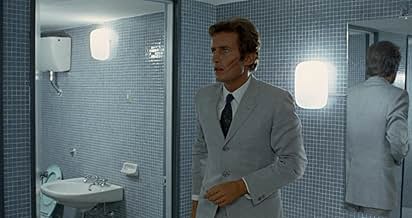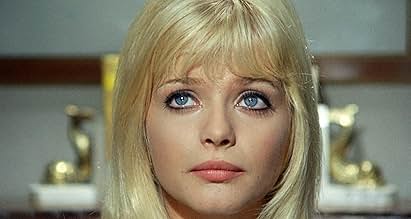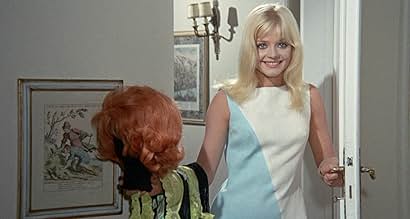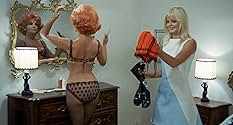IMDb RATING
5.8/10
1.9K
YOUR RATING
The depraved manager of a high-tech poultry factory is pulled into a love triangle with his domineering wife and her sexually-liberated cousin, leading to double-crosses and murder.The depraved manager of a high-tech poultry factory is pulled into a love triangle with his domineering wife and her sexually-liberated cousin, leading to double-crosses and murder.The depraved manager of a high-tech poultry factory is pulled into a love triangle with his domineering wife and her sexually-liberated cousin, leading to double-crosses and murder.
- Director
- Writers
- Stars
Jean-Louis Trintignant
- Marco
- (as Jean Louis Trintignant)
- Director
- Writers
- All cast & crew
- Production, box office & more at IMDbPro
Featured reviews
Let's be honest, the very title and premise are so wildly curious as to almost demand viewership; it's billed as a thriller, but expectations just go right out the window. The opening minutes don't do much to help form a concrete notion: between Bruno Maderna's excellent, vibrant score, unnerving in its emphatic discordance, and the wealth of imagery to greet us in short order, it's hard to know just what it is we've committed to watching - yet also hard not to be invested in the bizarrerie. As the narrative starts to take shape a more clear notion forms of what 'Death laid an egg' is about. Though in the broad strokes it may fit squarely into a classic Italian genre, and there are distinct difficulties with the feature as it presents, it's still suitably intriguing and engaging to be worth exploring on its own merits.
About those problems, though. As much as the movie works to catch our attention at the very start, it feels a little bit as though it's compensating for plot development that's meager and unbothered as the story first picks up. And that continues to hold true - a persistent swing of the pendulum between arresting imagery and audio, and mundane and gradual advancement of the story. Ultimately I think the back and forth between one end of the spectrum and another means we get roughly equal amounts of both - but that doesn't mean the picture is perfectly balanced. Because by the same token, Franco Arcalli's sharp, brisk editing helps to reinforce the near phantasmagoric audiovisual overload, maintain the overall pace, and build tension and suspense. Yet much of the sequencing comes across as disordered, furthering the sense of imbalance, and even incoherence, as a variety of story ideas are introduced that seem peculiarly disparate. For that matter, I believe the narrative is complete, but it struggles to even feel cohesive: some small included scenes only heighten the confusion, and maybe I just blinked at the exact wrong time, but there's also a lack of clarity in some regards.
What it comes down to is that 'Death laid an egg' tries very hard to give us a veritable cacophony of light and sound, and it succeeds in that aim. The trouble is that this choice serves to chop the plot into a deeply fragmented construction - yet without that fundamental flair, at its roots the plot is actually quite ordinary and unremarkable. Some aspects of it frankly feel altogether contrived. What we have is an issue of overwhelming style taking precedence over merely serviceable substance, and there's no great victory possible in the midst of that dichotomy. It's not that this is outright bad - not at all! I do admire the endeavor, and the gumption to fashion a story in this way. There are a few noteworthy names in the cast, and I think everyone turns in fine, nuanced displays of acting. The production design, art direction, and all manner of contributions from behind the scenes all look great generally, even when some elements fail to wholly comport. Giulio Questi demonstrates capable skills as director, and there are some splendid bits and pieces of ideas in the screenplay he wrote with Franco Arcalli.
Somehow, though, when all is said and done, much of the value gets subsumed by the kaleidoscopic film-making and storytelling. Unorthodox craft works well for many titles, yet the method must not overshadow the content as it does here. I do like 'Death laid an egg' more than I don't, but I wish I liked it more - and just as it was curiosity that drew me in at the start, having watched, curiosity may remain the best reason to check it out. It's duly recommendable for a number of reasons - fans of giallo, or the cast; appreciation of atypical movie-making or narratives, or of brilliant, memorable music. By whatever means one discovers 'Death laid an egg,' however, potential viewers should just keep in mind that one way or another it's not quite the viewing experience it inherently submits itself to be.
About those problems, though. As much as the movie works to catch our attention at the very start, it feels a little bit as though it's compensating for plot development that's meager and unbothered as the story first picks up. And that continues to hold true - a persistent swing of the pendulum between arresting imagery and audio, and mundane and gradual advancement of the story. Ultimately I think the back and forth between one end of the spectrum and another means we get roughly equal amounts of both - but that doesn't mean the picture is perfectly balanced. Because by the same token, Franco Arcalli's sharp, brisk editing helps to reinforce the near phantasmagoric audiovisual overload, maintain the overall pace, and build tension and suspense. Yet much of the sequencing comes across as disordered, furthering the sense of imbalance, and even incoherence, as a variety of story ideas are introduced that seem peculiarly disparate. For that matter, I believe the narrative is complete, but it struggles to even feel cohesive: some small included scenes only heighten the confusion, and maybe I just blinked at the exact wrong time, but there's also a lack of clarity in some regards.
What it comes down to is that 'Death laid an egg' tries very hard to give us a veritable cacophony of light and sound, and it succeeds in that aim. The trouble is that this choice serves to chop the plot into a deeply fragmented construction - yet without that fundamental flair, at its roots the plot is actually quite ordinary and unremarkable. Some aspects of it frankly feel altogether contrived. What we have is an issue of overwhelming style taking precedence over merely serviceable substance, and there's no great victory possible in the midst of that dichotomy. It's not that this is outright bad - not at all! I do admire the endeavor, and the gumption to fashion a story in this way. There are a few noteworthy names in the cast, and I think everyone turns in fine, nuanced displays of acting. The production design, art direction, and all manner of contributions from behind the scenes all look great generally, even when some elements fail to wholly comport. Giulio Questi demonstrates capable skills as director, and there are some splendid bits and pieces of ideas in the screenplay he wrote with Franco Arcalli.
Somehow, though, when all is said and done, much of the value gets subsumed by the kaleidoscopic film-making and storytelling. Unorthodox craft works well for many titles, yet the method must not overshadow the content as it does here. I do like 'Death laid an egg' more than I don't, but I wish I liked it more - and just as it was curiosity that drew me in at the start, having watched, curiosity may remain the best reason to check it out. It's duly recommendable for a number of reasons - fans of giallo, or the cast; appreciation of atypical movie-making or narratives, or of brilliant, memorable music. By whatever means one discovers 'Death laid an egg,' however, potential viewers should just keep in mind that one way or another it's not quite the viewing experience it inherently submits itself to be.
Terms like "bizarre", "eccentric" and "convoluted" are often used too lightly in reviews for Italian gialli, but in case of "Death Laid an Egg" they are severe understatements! I'm not even sure this one qualifies as a giallo, because although the film got released before the genre properly started booming (in 1968), it's already experimenting with different plots and thinking out-of-the-box in terms of style and plot twists. Generally speaking, a giallo either handles about a masked psycho-killer with black gloves savagely butchering people - preferably pretty young models - with sharp objects, or it handles about a convoluted murder conspiracy complete with sexual intrigues, betrayal and triangular relationships. "Death Laid an Egg" primarily fits into the second category, but also somewhat in the first one, and then still even a lot more! The most intriguing aspect about the triangular relationship (between a man, his wife and her secretary) is that it takes place at the woman's family business; - a chicken far where insanely unethical experiments take place (headless/boneless poultry monstrosities will haunt your nightmares!). Furthermore, the man has a fetish for slicing up prostitutes, and the mistress may or may not have a secret agenda with a hunky marketing agent. One thing's for sure, though, all the loose ends form a compelling wholesome that keeps you gazing at the screen and - unlike many other similar films - everything nicely comes together in the end, and "Death Laid an Egg" does deliver in every department (mystery, suspense, flamboyance, ...)
Writer/director Giulio Questi was a very strange individual, to say the least. He seemingly doesn't care about traditional cinematic patterns or logical narrative structure, and many sequences/plot twists appear to be improvised on the spot. The opening credits, the soundtrack, and many camera perspectives are utterly weird! Questi also made the western-outcast "Se sei vivo spara", which is possibly the strangest Spaghetti Western ever, and the reputedly bonkers psychological horror/thriller "Arcana" (which I haven't seen yet).
Writer/director Giulio Questi was a very strange individual, to say the least. He seemingly doesn't care about traditional cinematic patterns or logical narrative structure, and many sequences/plot twists appear to be improvised on the spot. The opening credits, the soundtrack, and many camera perspectives are utterly weird! Questi also made the western-outcast "Se sei vivo spara", which is possibly the strangest Spaghetti Western ever, and the reputedly bonkers psychological horror/thriller "Arcana" (which I haven't seen yet).
I wouldn't label this as a "giallo", there is no particular suspense or scary moments, so don't expect anything like that... it mainly is a criticism on capitalism, mass production and industrial society, within a good story which involves obviously a murder. It may sound a bit Marxist as a statement, and maybe that was Giulio Questi's political view, but seen today it results in a naive but quite original and experimental movie from the seventies. Some moments (the best ones) are truly grotesque and surreal... some very nice actresses and lots of beautiful advertising posters from the time in the background, the actors are very good and generally speaking it is a good and entertaining movie. The only major problem I had was with the music, which is over-used and not pleasant at all... it could work conceptually, but the truth is, after a while you cannot stand it anymore. An interesting movie, surely not to everybody's taste. 7/10
Giulio Questi's early giallo is very different from the genre, but it can be called giallo since it has a mystery audience has no idea about until the very end. But the mystery doesn't involve the identity of the possible murderer but the various and altering relations between the characters. Marco, Anna and Gabrielle live together and work together, in a huge chicken farm / factory owned by Anna. Soon it is clear all three, plus their friends, have another things in their minds; they act what they don't say and vice versa. This gives the director Questi a great opportunity to handle topics of greed and money that easily blind.
The way how Questi handles his theme is very satiric, thus making the film close with Mario Bava's Reazione a catena / Bay of Blood 3 years later. Both films have serious theme about man's ability to turn violent in his search for monetary benefit and freedom and both films discuss this satirically, with maximal effect since comedy is often at its best when the subject stays serious and universally important. As a pure giallo mystery, the film is also quite rich since the audience has no idea what is going on until the very end when it is revealed. Questi uses very interesting editing technique that makes many of the scenes "broken", using flashbacks, dreamy/nightmarish moods and so on. This forces us to dive deeper inside the characters and their varying points of views.
The film has also an interesting topic about man's subconscious and instincts. Main character Marco is considered "morally corrupt" due to his unusual sexual preferences. But at the same time Questi shows how much there is inside human brain, needs, wills, desires, we don't necessarily want to talk about in fear of unacceptance or being classed as "sick." We are not as civilized, as perfect, as the moral codes of society try to suggest when they go after "the morally sick" Marco. There's also a very harrowing and unforgettably absurd scene at the experiment lab of the factory. The doctors have created a manipulated type of chicken that would be commercially extremely profitable to the factory while at the same time the manipulated monsters are a plentiful spitting at nature's face. Marco is against this, against the others around him while he has been named "morally wrong" and bad. Questi had important things and questions in mind and also the ability to turn them into a film.
Real themes in a giallo thriller are quite rare and Questi has done it very well. This is among the earliest but also among the very best of the giallo.
The way how Questi handles his theme is very satiric, thus making the film close with Mario Bava's Reazione a catena / Bay of Blood 3 years later. Both films have serious theme about man's ability to turn violent in his search for monetary benefit and freedom and both films discuss this satirically, with maximal effect since comedy is often at its best when the subject stays serious and universally important. As a pure giallo mystery, the film is also quite rich since the audience has no idea what is going on until the very end when it is revealed. Questi uses very interesting editing technique that makes many of the scenes "broken", using flashbacks, dreamy/nightmarish moods and so on. This forces us to dive deeper inside the characters and their varying points of views.
The film has also an interesting topic about man's subconscious and instincts. Main character Marco is considered "morally corrupt" due to his unusual sexual preferences. But at the same time Questi shows how much there is inside human brain, needs, wills, desires, we don't necessarily want to talk about in fear of unacceptance or being classed as "sick." We are not as civilized, as perfect, as the moral codes of society try to suggest when they go after "the morally sick" Marco. There's also a very harrowing and unforgettably absurd scene at the experiment lab of the factory. The doctors have created a manipulated type of chicken that would be commercially extremely profitable to the factory while at the same time the manipulated monsters are a plentiful spitting at nature's face. Marco is against this, against the others around him while he has been named "morally wrong" and bad. Questi had important things and questions in mind and also the ability to turn them into a film.
Real themes in a giallo thriller are quite rare and Questi has done it very well. This is among the earliest but also among the very best of the giallo.
Like many other European thrillers this early Italian giallo was obviously very influenced by the French film "Diabolique" with it's basic plot of a wealthy husband, wife, and mistress all scheming against each other. And like the later film "So Sweet, So Perverse" the movie throws another man (Jean Sorel)into the mix as a kind of a fourth side to the main triangle. This movie is no conventional thriller, however. For one thing it has kind of psychedelic, surrealist pop-art late 60's sensibility to it that always threatens to overwhelm (and occasionally does) the rational story-line. For another thing, it has a VERY bizarre setting, a fully-automated chicken plant. (There's a scene where the scientists at the plant create "monster" chickens without wings or beaks that really makes one want to swear off poultry for life). This unusual setting adds a whole industrial conspiracy angle and, moreover, a weird sort of social commentary to the proceedings.
The acting is all very good. Jean-Louis Tritigant plays a similar role to the one he'd later play in "So Sweet, So Perverse", but here he also might be a serial killer who is offing prostitutes in a roadside motel. Latin sex symbol Gina Lollabridga makes a rare appearance in this kind of film (which is actually much more entertaining than some of the bigger-budgeted movies she starred in)as the domineering wife. The young mistress is believably played by Ewa "Candy" Aulin, although she is not quite as enjoyable when she's not naked and not speaking in her natural (undubbed) heavy Swedish accent. (Aulin also appeared in another excellent, if even more obscure, giallo called "The Double"). The best thing about the movie though is the ending where EVERYBODY manages to get their just desserts--and then some. Definitely check this one out.
The acting is all very good. Jean-Louis Tritigant plays a similar role to the one he'd later play in "So Sweet, So Perverse", but here he also might be a serial killer who is offing prostitutes in a roadside motel. Latin sex symbol Gina Lollabridga makes a rare appearance in this kind of film (which is actually much more entertaining than some of the bigger-budgeted movies she starred in)as the domineering wife. The young mistress is believably played by Ewa "Candy" Aulin, although she is not quite as enjoyable when she's not naked and not speaking in her natural (undubbed) heavy Swedish accent. (Aulin also appeared in another excellent, if even more obscure, giallo called "The Double"). The best thing about the movie though is the ending where EVERYBODY manages to get their just desserts--and then some. Definitely check this one out.
Did you know
- GoofsIn the first slasher scene, the knife blade doesn't show any blood till after 7 slashes.
- ConnectionsFeatured in Ultimate Poliziotteschi Trailer Shoot-Out (2017)
Details
Contribute to this page
Suggest an edit or add missing content


